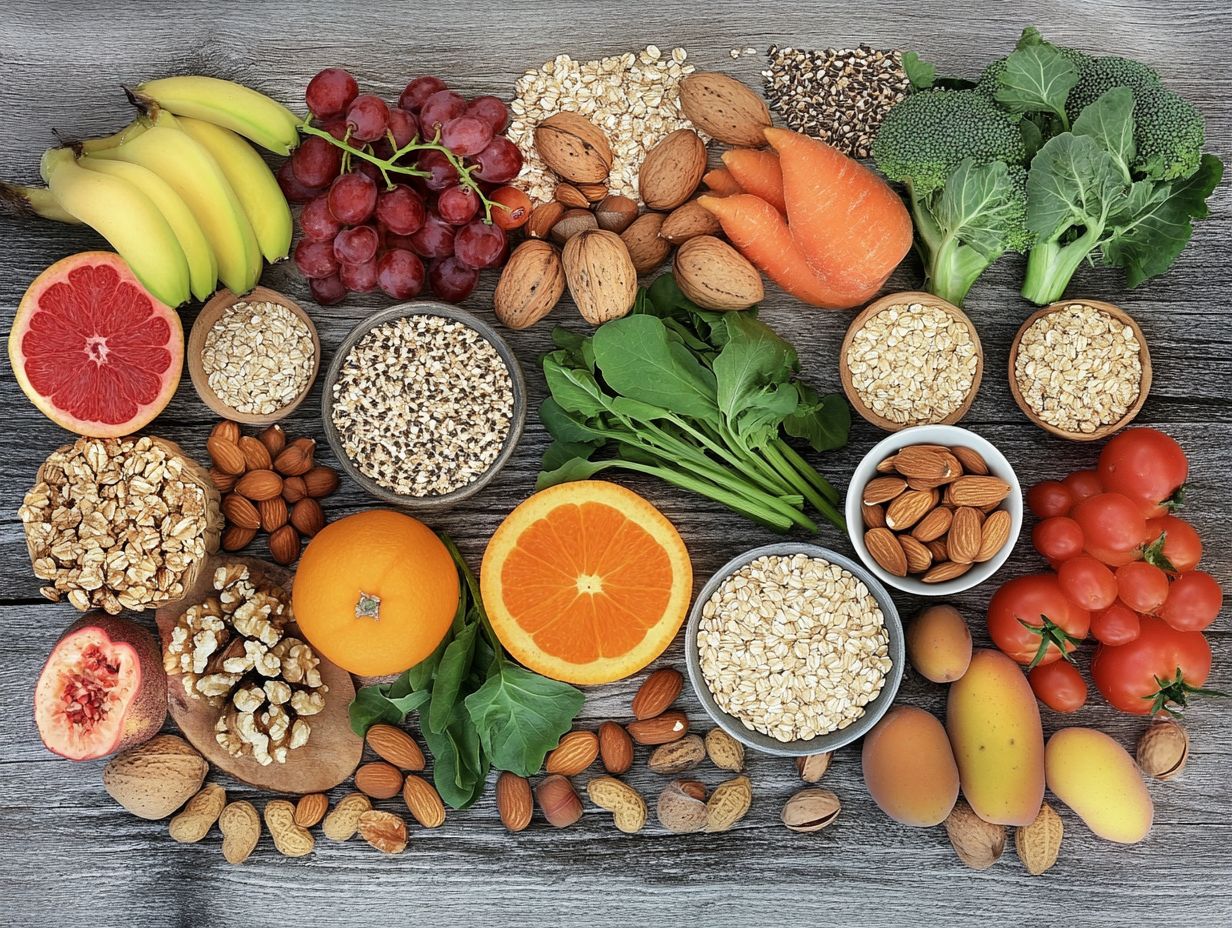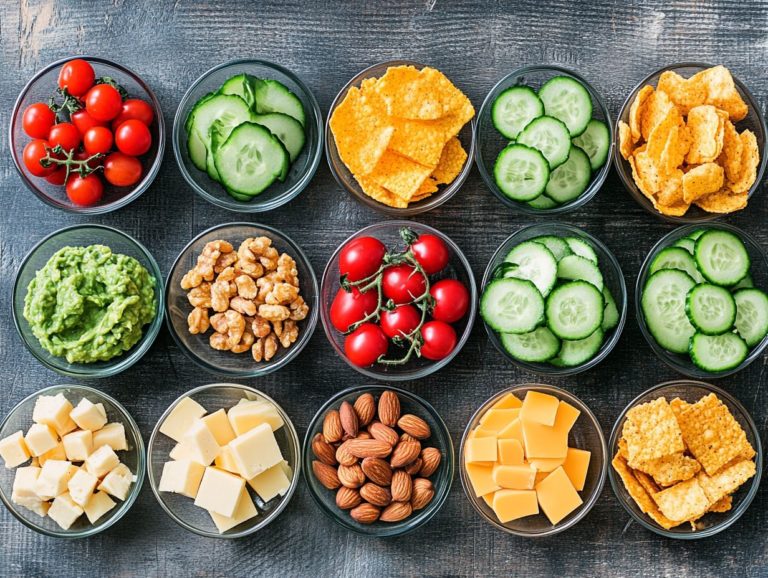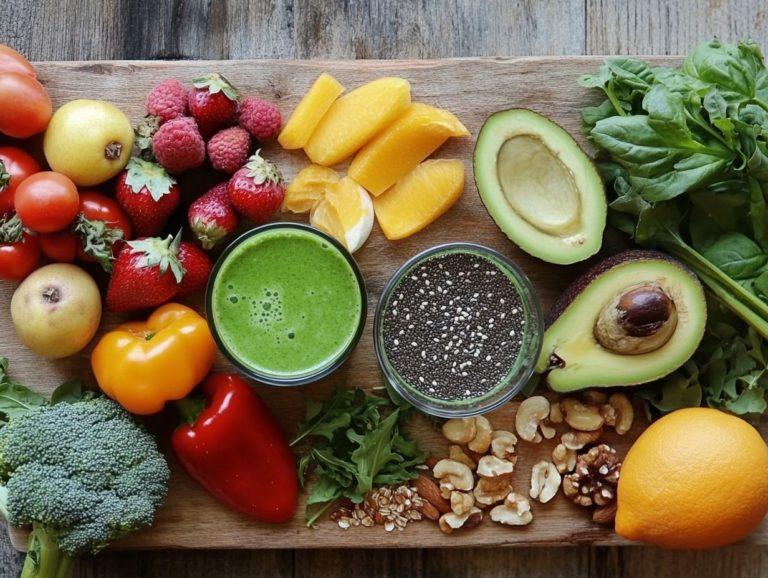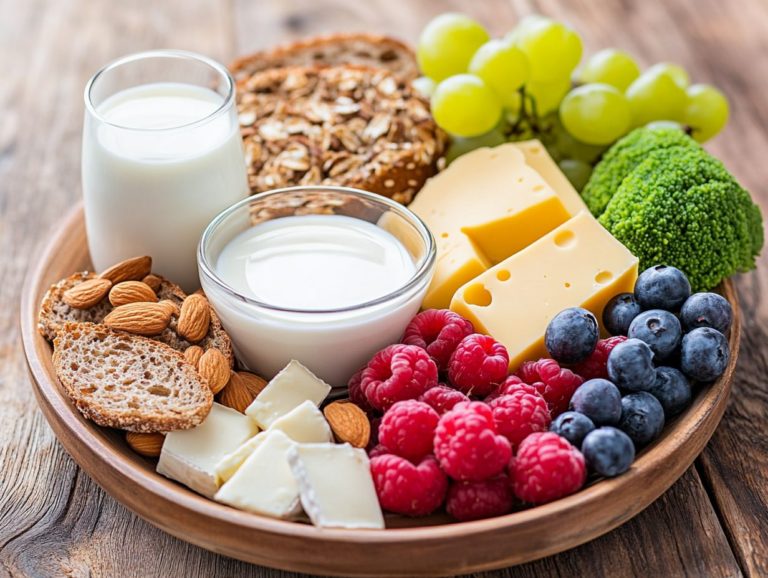The Role of a Nourishing Diet in Mental Health
Mental health is increasingly acknowledged as a crucial element of overall well-being, and your diet significantly impacts how you feel. Discover how simple dietary changes can greatly benefit your mental health.
This article explores the important link between nutrition and mental health, emphasizing essential nutrients that bolster brain function and elevate mood.
You ll learn to identify foods that enhance mental resilience and explore how your diet can influence conditions such as depression and anxiety. We offer practical tips for nourishing your mind through what you eat.
Contents
- Key Takeaways:
- Mental Health and Nutrition: An Overview
- Essential Nutrients for Mental Health
- Foods that Promote Mental Health
- The Impact of Diet on Specific Mental Health Conditions
- Incorporating a Nourishing Diet into Your Lifestyle
- Additional Strategies for Improving Mental Health
- Frequently Asked Questions
- What is the role of a nourishing diet in mental health?
- How does a nourishing diet impact mental health?
- What are some examples of a nourishing diet for mental health?
- Can a nourishing diet prevent mental health disorders?
- Does a nourishing diet have the same impact on everyone’s mental health?
- Are there any specific nutrients that are particularly important for mental health?
Key Takeaways:

A nourishing diet plays a vital role in promoting mental health and overall well-being. Key nutrients such as vitamins and minerals can support brain function and improve mood and anxiety levels.
Incorporating a healthy and balanced diet into daily life, along with other lifestyle factors, can have a positive impact on managing mental health conditions.
Mental Health and Nutrition: An Overview
The important link between nutrition and mental health is essential for your overall well-being, intertwining various dietary patterns that significantly influence your emotional and cognitive health.
By choosing foods rich in nutrients, you can enhance brain function, support the production of brain chemicals, and stabilize blood sugar levels. This not only reduces the risk of mental illness but also boosts your emotional resilience.
Understanding the impact of your dietary choices including approaches like the Mediterranean diet and traditional eating habits can be invaluable in addiction recovery, ultimately enhancing both your emotional and cognitive clarity.
The Connection Between Diet and Mental Well-being
The connection between diet and mental well-being is truly profound. Various dietary patterns can significantly impact your emotional health and cognitive function.
Research shows that certain foods can enhance your brain function and bolster emotional resilience, while others especially processed options may contribute to mental health issues.
A growing body of evidence underscores the importance of nutrients like omega-3 fatty acids, B vitamins, and antioxidants in promoting mental clarity and emotional balance. For example, diets abundant in fatty fish, leafy greens, and fresh fruits have been linked to better mood regulation and improved cognitive abilities.
On the flip side, relying heavily on processed foods packed with sugars and unhealthy fats can lead to inflammation, which is increasingly associated with anxiety and depression.
Thus, maintaining a balanced diet one that is low in refined carbohydrates and rich in nutrient-dense choices supports not just your physical health but also fosters the mental resilience you need to navigate life s challenges effectively.
Essential Nutrients for Mental Health
Essential nutrients are pivotal in bolstering your mental health, with particular vitamins and minerals making substantial contributions to cognitive function and emotional well-being.
Nutrients like omega-3 fatty acids, vitamin E, folic acid, and magnesium are especially vital for regulating brain activity, optimizing nutrient absorption, and mitigating inflammation. Prioritizing these nutrients can profoundly impact your overall mental clarity and emotional resilience.
Key Vitamins and Minerals for Brain Function
- Omega-3 fatty acids: Crucial for maintaining the structure and communication of brain cells, essential for memory and mood regulation. Found in fish.
- Vitamin E: A powerful antioxidant that shields your brain from oxidative stress. Found in nuts and seeds.
- Folic acid: Critical for neurotransmitter production, influencing both mood and emotional stability. Found in leafy greens and legumes.
- Magnesium: Linked to enhanced learning and memory, facilitating nerve signaling. Found in whole grains and leafy greens.
Incorporating these nutrients from food sources can lay a robust foundation for improved cognitive abilities.
Foods that Promote Mental Health

Incorporating specific foods into your diet can profoundly enhance your mental health. Nutrient-rich options, particularly those rich in omega-3 fatty acids, antioxidants, and fiber, are especially beneficial.
Embrace dietary patterns like the Mediterranean diet, which highlights whole grains and fermented foods. These can further bolster your emotional and cognitive well-being.
Top Foods for Boosting Mood and Reducing Anxiety
Certain foods effectively elevate your mood. They also help alleviate anxiety.
Consider foods rich in omega-3 fatty acids, antioxidants, and healthy fats. By incorporating whole grains and nutrient-rich options into your diet, you can significantly enhance your emotional well-being.
For instance, indulging in fatty fish like salmon or munching on walnuts provides essential omega-3s, which can help alleviate symptoms of depression and anxiety. These healthy fats support brain health.
Berries, brimming with antioxidants, combat oxidative stress in your body, fostering a calmer state of mind.
Don t overlook leafy greens like spinach and kale. They are packed with folate, vital for serotonin production the natural mood regulator.
Complex carbohydrates found in quinoa and brown rice stabilize blood sugar levels. This helps ward off the mood swings that often accompany anxiety and stress.
By consciously choosing these nourishing foods, you uplift your spirits and cultivate a deeper sense of emotional stability.
The Impact of Diet on Specific Mental Health Conditions
Your diet can make a huge difference in how you feel every day. Nutrition directly affects the severity of issues like depression and anxiety.
By recognizing how chronic stress and inflammation influence behavioral health, you can tailor your dietary choices for better mental health outcomes.
How Nutrition Can Affect Depression, Anxiety, and Other Disorders
Nutrition wields remarkable influence over depression, anxiety, and various mental health disorders. Specific dietary patterns play a pivotal role in your emotional well-being.
Embrace a balanced diet rich in essential nutrients. This can significantly alleviate symptoms and enhance your overall health.
Research indicates that foods abundant in omega-3 fatty acids, such as fatty fish and walnuts, offer substantial anti-inflammatory benefits. They promote mental clarity and mood stability.
Incorporate whole grains, fruits, and vegetables into your diet. This can bolster gut health, which is closely linked to emotional regulation.
Essential nutrients like B vitamins, magnesium, and zinc are vital for neurotransmitter function, potentially reducing the risk of depression and anxiety.
Studies show that following a Mediterranean diet highlighting plant-based foods and healthy fats can lead to improved mental health outcomes. This underscores the profound connection between your dietary choices and emotional state.
Incorporating a Nourishing Diet into Your Lifestyle
Incorporating a nourishing diet into your lifestyle is crucial for achieving optimal mental health. This journey requires making conscious choices that align with a healthy eating pattern.
Engage in meal planning, seek culinary support, and utilize online resources. This can streamline the process and ensure your nutrition meets your unique needs.
Start adding these amazing foods to your plate today for a brighter mood and a calmer mind!
Don’t wait transform your meals and boost your mental health now!
Practical Tips for Maintaining a Healthy Diet for Mental Health

Maintaining a healthy diet for your mental health can be effortlessly achievable with practical tips like effective meal planning. This approach helps stabilize your blood sugar levels and fortifies emotional resilience.
Embracing a mindful attitude toward nutrition is essential for nurturing your overall well-being. By preparing balanced meals filled with a variety of nutrient-dense foods, you ensure that you’re receiving the essential vitamins and minerals that enhance brain function.
This means making whole grains, leafy greens, and healthy fats a priority in your weekly menu. Practicing mindful eating savoring each bite and tuning into your hunger cues can deepen your connection to food, alleviating the stress and anxiety often associated with mealtimes.
These strategies not only bolster your physical health but also play a crucial role in emotional stability, enabling you to tackle daily challenges with a clearer, more focused mindset.
Additional Strategies for Improving Mental Health
Enhancing your mental health involves many parts that extend beyond just nutrition. It’s about embracing lifestyle factors that nurture your emotional health and overall well-being.
Incorporate mindfulness practices and manage stress. Prioritize physical recovery methods to elevate your mental well-being.
Other Lifestyle Factors to Consider Alongside Diet
When you think about mental health, it s essential to recognize that lifestyle factors beyond diet also play a crucial role. Mindfulness practices, stress management techniques, and regular exercise are all key components that work together to enhance your emotional well-being and overall mental resilience.
Incorporating regular exercise be it a brisk walk, a calming yoga session, or even a lively dance can boost your mood instantly and alleviate anxiety. Nutrition is equally vital; a balanced diet rich in omega-3 fatty acids, whole grains, and antioxidants can significantly support cognitive health.
Engaging in mindfulness practices like meditation or deep-breathing exercises can help you cultivate a sense of calm and sharpen your focus, allowing you to navigate daily stresses with greater ease. When you combine these lifestyle choices, you create a comprehensive strategy that nurtures a healthier mental state, highlighting the importance of a holistic approach to your overall well-being.
Frequently Asked Questions
What is the role of a nourishing diet in mental health?
A nourishing diet plays a crucial role in maintaining optimal mental health, as it provides essential nutrients that support brain function and emotional well-being. For more insights, you can explore the role of nutrition in mental health.
How does a nourishing diet impact mental health?

A nourishing diet can improve mood, reduce symptoms of depression and anxiety, increase energy levels, and enhance cognitive abilities!
What are some examples of a nourishing diet for mental health?
A nourishing diet includes whole foods such as fruits, vegetables, whole grains, lean proteins, and healthy fats! It also involves limiting processed and sugary foods.
Can a nourishing diet prevent mental health disorders?
While there is no guarantee, a nourishing diet can potentially reduce the risk of developing certain mental health disorders, such as depression and anxiety.
Does a nourishing diet have the same impact on everyone’s mental health?
Every individual’s body and brain chemistry is unique, so the effects of a nourishing diet may vary. However, a balanced and nutrient-rich diet is beneficial for overall mental and physical health.
Are there any specific nutrients that are particularly important for mental health?
Yes! Certain nutrients have been linked to improved mental health, such as omega-3 fatty acids (healthy fats found in fish that support brain function), B vitamins, magnesium, and vitamin D. These can be found in foods like fatty fish, leafy greens, nuts and seeds, and fortified dairy products.
Start making these dietary changes today for a healthier mind!






